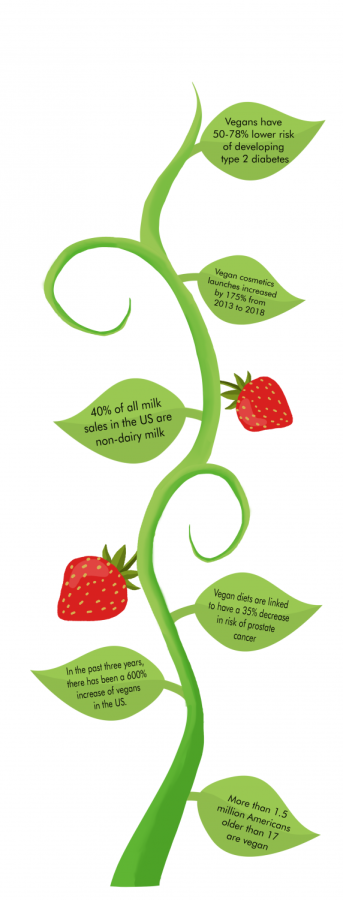Not just salads: veganism and its impacts
Peeling the layer away from vegan stereotypes and misconceptions
Untangle the truths about veganism and the impacts it creates
March 29, 2019
On social media and websites like YouTube, numerous influencers promote vegan products, post their picture-perfect avocado toast or rave about smoothie bowls. The depiction of veganism on social media glorifies the lifestyle, as the actual concept of veganism is modest: vegans refrain from consuming animal products, which include not only meat but also eggs, dairy products and other animal-derived substances. Though there are some stereotypes about vegans, there is much more to veganism than just the stereotypes associated with it.
There are several reasons behind why one might choose to to follow a vegan diet. Many take ethical reasons and religious beliefs into consideration before making the switch to veganism, and some have been vegan their entire lives because of cultural beliefs, such as the prohibition of consuming animal products in Hinduism. Some may be concerned about the ethics of slaughtering animals for food, while others are simply looking for a diet that better fits their health needs.
Veganism, which is based on a clean and plant-based diet, appeals greatly to health enthusiasts. According to Medical News Today, the lack of animal products in the vegan diet results in a lower risk of diseases, such as heart disease, compared to meat eaters, as vegans do not consume animal fats. Furthermore, according to Live Kindly, a popular vegan health publication, the plant-based diet enables vegans to take in fewer calories than their vegetarian or meat-eating counterparts do, thus explaining the reduced risk of obesity and lower body mass indexes in vegans. Many have developed healthy eating habits as a result of being on vegan diets, which promote consumption of more fruits and vegetables.
“I became vegan because I was already dairy-free because I can’t eat dairy and I am vegetarian, and my mom can’t eat eggs,” said sophomore Ria Chaudhary. “So, I was like, ‘well, everything I’ve been eating is basically already part of the vegan diet so might as well take that one more step for the environment.’”
Contrary to popular belief, veganism is not restricted to a diet composed only of salads. In fact, the classic snack cookie, the Oreo, is vegan. Vegan eating does not necessarily mean clean eating; veganism is simply about one’s dietary choices that determine food’s effect on the body.
On a more political note, veganism, having risen to fame in the 21st century, is often stereotyped to be popular among liberals. In truth, veganism has nothing to do with liberalism; it is only a lifestyle choice. The extreme liberal stereotype is only reflective of a select group of vegans.
As a result of following a vegan diet, many dieters have reported a boost in energy and a glowing complexion. According to the Elite Daily, when one eats less meat, the body uses less energy to digest food. Unlike protein from meats, proteins from vegan foods provide energy without causing energy crashes, which are feelings of fatigue following meals. Media company Insider says that plants contain nutrients, such as collagen, that nurture the skin and allow it to have the sought after “glow.” By eating clean, one is keeping both their body and skin healthy. Thus, it is not a surprise that athletes in particular are turning to veganism.”
“By increasing our intake of anti-inflammatory foods and decreasing our intake of pro-inflammatory [animal-based) foods, veganism has the potential to benefit athletes,” said fitness coach and nutritionist Karina Inkster. “Indeed, many professional athletes are turning to veganism entirely for its performance-enhancing effect. These athletes are noticing they can train harder and recover more quickly, but we do need more peer-reviewed research in this area.”
Harvard Health Publishing has linked vegan diets to lower blood pressure and cholesterol, and lower rates of heart disease, type 2 diabetes and some types of cancer. By cutting out the animal fat from their diet, vegans are less likely to have illnesses and conditions linked to animal fat, such as rheumatoid arthritis and hypertension. The diet also causes diversity of the bacteria in the colon, leading to healthier gut biomes, the community of microorganisms in the gut. Such microorganisms help the body digest certain foods that the stomach and small intestine have a hard time digesting. They also help the body by providing vitamin B and K and act like a barrier for the immune system. A healthy and balanced gut microbiota is important for digestion and a healthy immune system.
In recent years, veganism has gained traction, especially on social media. According to the Vegan Society, in the last five years, the number of vegans has quadrupled. For vegan influencers, using social media platforms is a perfect way to help promote veganism. Instagram’s highly visual platform allows people to follow influencers’ diets, recipes and tips. Instagram posts about veganism appeal to users.
“Veganism is growing in popularity recently in part due to moral and dietary advantages over other diets, but also because it has a fairly simple proscription: eat only plant-based foods,” said culinary teacher Aaron Harper. “Other diets that focus on weight loss use some gimmick or complex eating schedule in order to trick the body into shedding fat, but those restrictions are difficult to accommodate with the mainstream lifestyle. Veganism works because it is not new and individuals advocating for it can point to cultures around the world and say, ‘See? Those people have been eating a plant-based diet for centuries and it is working out for them.’”
Jumping on the bandwagon, companies and supermarkets have dramatically increased the labeling and production of vegan-friendly foods. According to Food Revolution, Australia, for example, has seen the number of food products labeled as vegan-friendly rise by 92 percent (food labeled as vegan) from 2014 to 2016. Misinformed shoppers become the target of companies and supermarkets aiming to strengthen the view of vegan products being more healthy, even though the products may not be the healthiest.
“My concern regarding marketing vegan-friendly products is not about veganism itself but the consumption of processed foods in general,” Harper said. “Vegan-friendly processed foods are not immune to pitfalls that plague all processed foods, namely excesses in sugar and salt. Consumers should be aware of when buying foods that claim to be vegan-friendly; it does not automatically make that product healthy. While it is possible to get all of the necessary protein out of a plant-based diet, people switching to veganism should be mindful that it requires consuming them from multiple sources in order to get the complete package.”
Despite popular myths and stereotype that oversimplify veganism, there is more to veganism than only not eating meat and dairy. As the vegan diet has become increasingly popular, more people are being exposed to what being vegan truly means. Judge veganism too quickly, and one might just miss out on all the good it can bring.





























































Tony S • Apr 2, 2019 at 3:26 pm
I was so thrilled to see this article in the Lynbrook student paper. Fantastic writing and such an important topic for students to know about. I hope you can continue to include more articles and information about the importance of adopting a vegan lifestyle for our health and the health of the planet. Keep up the great work!